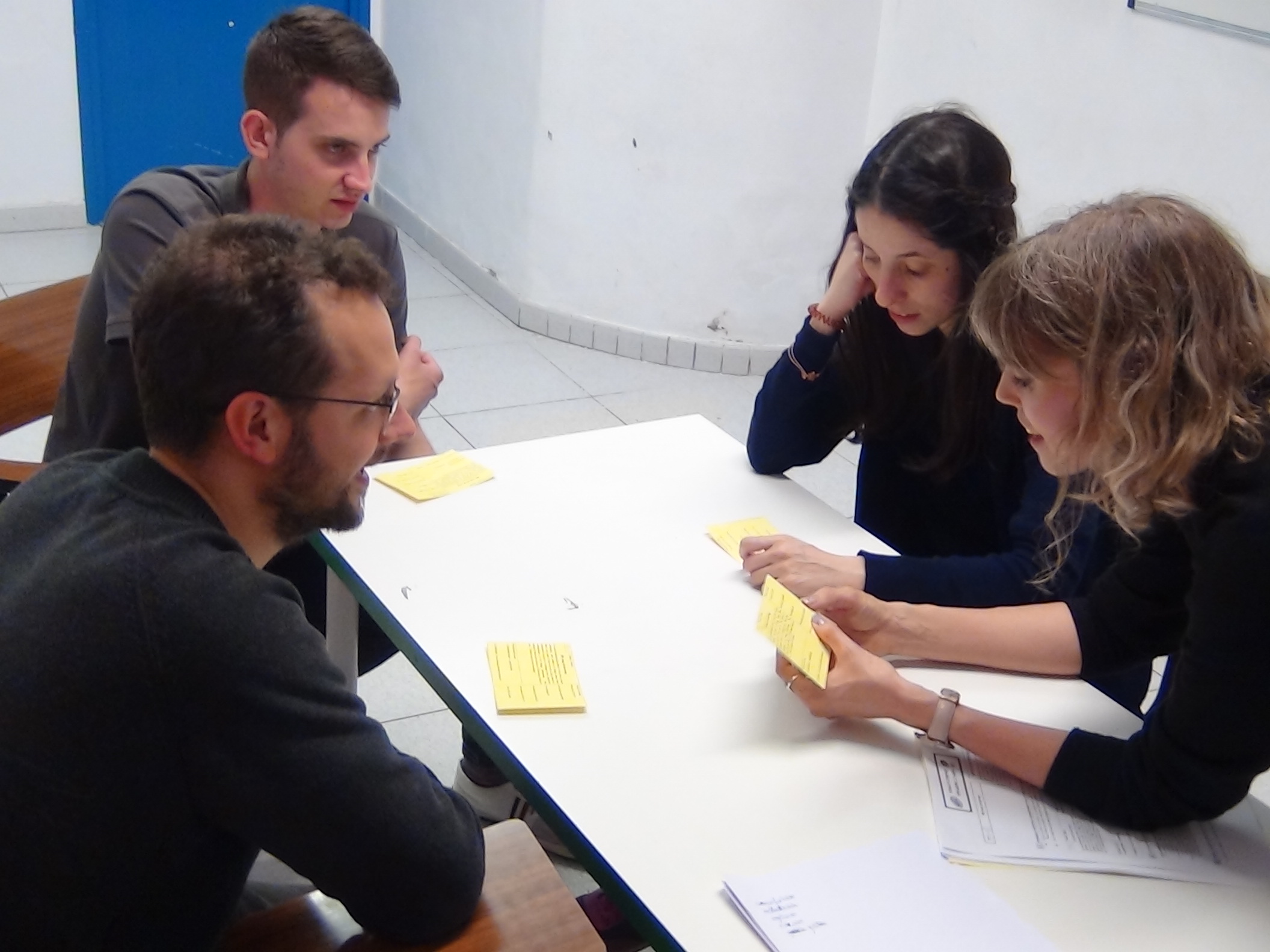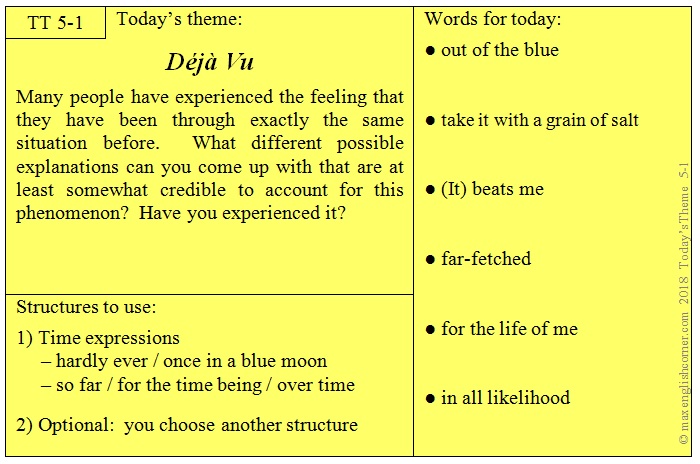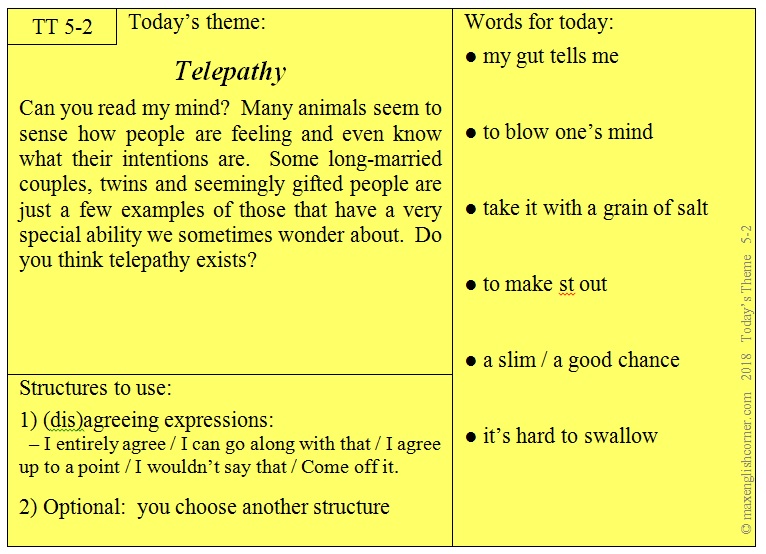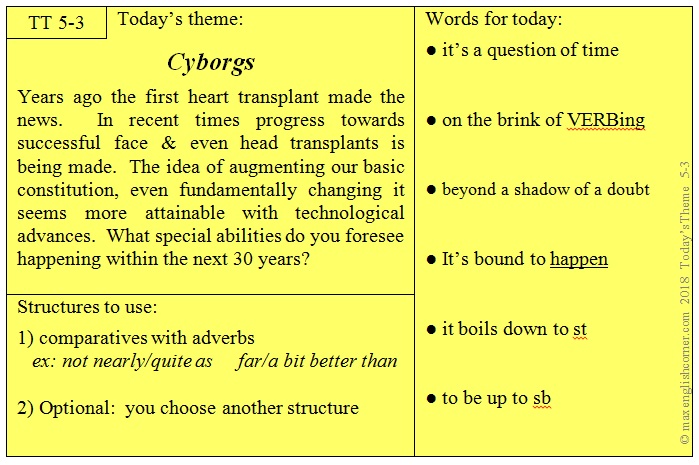Today’s Theme for speaking 5

Welcome to the Today’s Theme page for The Paranormal. Here you will find 3 different topic questions related to the theme, vocabulary that can be used in the discussions, and optional grammar structures that can also be included. The three questions provided below are independent from each other. Choose one topic for one class and if you like, choose another to follow up further on this theme in the next class.
After the suggestions on how to use the themes & cards you will find for each topic:
● An opening question to introduce the theme and generate some focused interest
● The cards to be handed out to the students
● A few examples of the optional structures which reflect the current theme
● A final question to put to the class (ending the discussion in groups)
The suggested lesson plan basically follows this approach:
PRE-DISCUSSION
● Ask the class an open question to stimulate some interest and bring the students’ attention to the area of focus
● Hand out the cards and go over the vocabulary
● If you decide to include the grammar option, elicit or provide an example or two to make sure the students have an idea of what to include in their speaking
● Students read the passage and remind them to include the target language
DISCUSSION
● Students speak in groups of 2, 3 or 4 for about 5 to 10 minutes
● Monitor, note difficulties, steer them in the right direction if needed
POST DISCUSSION
● Elicit from the class what came up while discussing the question
● Give them feedback about how well they completed the task
SUGGESTED APPROACH to using
TODAY’S THEME speaking cards in class
Click here if you’d like to see a suggested step-by-step plan
on how to use the cards in class
This is a general guide for a lesson plan, one which you can refer to when you use any of the Today’s Theme speaking cards.
If you want to print a copy, click here or on the icon at the bottom of the page
TEACHER’S GUIDES
For every new Today’s Theme speaking card, there is a different
Teacher’s Guide to accompany it.
The guides are at the bottom of this page and you can select the one
appropriate to the card you wish to use.
The information is the same as shown on this page, but in printable form.
Each guide contains
● possible lead-in questions to introduce the topic
● an example of the card
● examples of the optional grammar structures
● a post discussion follow-up question
DISCUSSION TOPIC 1: Déjà Vu
Possible opening questions to get the ball rolling
| 1 | What is déjà vu? Have you ever felt it? |
| 2 | You know what déjà vu is, right? Can you explain it to me? Are there different kinds? (ex: It’s only a sensation. // You can(‘t) predict what is going to happen while in it.) |
Examples of optional grammar structures to be included in the speaking
Time Expressionswhich refer to a particular event or period in time, duration, frequency, relation to another event (before/after/during) |
|
| Frequency | |
| ● hardly ever I did experience déjà vu, but it hardly ever happened to me. | |
| ● once in a blue moon Once in a blue moon it came on, but it definitely wasn’t a regular thing. | |
| ● (You could also introduce these 3 synonyms for occasionally: It happened every now & then / every so often /once in a while.) |
|
| Other | |
| ● so far So far it hasn’t happened to me. | |
| ● for the time being For the time being, scientists seem content to explain it as only a sensation, nothing more. ● over time Perhaps over time we will know more about it. |
|
NOTE: Quickly go over the expressions, eliciting the meaning and clarifying any doubts students may have over these expressions or others that may come up. Often in casual speaking the expressions can be used on their own, but if placed in a complete sentence, make sure the students are aware of the proper location. For example: Simple frequency adverbs for general information typically go before the verb with the exception of ‘be’. (I hardly ever go to the gym. I am hardly ever tired.) More detailed frequency adverbs go at the end of the idea / clause. (I go to the gym once a week. I am tired every day.).
Also, so far is not the same as until now. The first refers to an ongoing period of time from the past to the present and continuting into the future where the situation could change, but that is unknown. (So far no-one has proved that déjà vu really exists). ‘Until now’ means that before now things were a certain way, but now they are very different. (Until now I have always thought that déjà vu doesn’t exist.)
Possible question to end the groups speaking and bring the focus back to the class (and you)
| 1 | Is déjà vu just a feeling or is it something more? Can it be measured? |
| 2 | How would you feel if you experienced déjà vu on a frequent basis? What would you do? |
Prompt the students with more questions, to share with the class what they have discussed in their groups, to explore the theme a little further and perhaps get a variety of perspectives. Also encourage them to use the vocabulary (and structures) in their speaking with you.
DISCUSSION TOPIC 2: Telepathy
Possible opening questions to get the ball rolling
| 1 | What am I thinking right now? |
| 2 | I’m thinking of a colour / of a number between 1 and 10. Can you guess what it is? |
Examples of optional grammar structures to be included in the speaking
Agreeing & Disagreeing Expressions |
||
| ● I entirely agree (with you / with that). I agree (with you / with that) entirely | ||
| –You can substitute ‘entirely’ with ‘completely’ and ‘totally’. –The person (in this case ‘you’) and the opinion a person has are regarded the same, at least to the extent that they are strongly associated with each other. Both the person and ‘that’ (or ‘what you said’) are introduced by the same preposition with. |
||
| ● I can / could accept that / go along with that. | ||
| ● I agree with you up to a point. | ||
| ‘Maybe’ can also be used to communicate partial acceptance. For example: Maybe, but I can’t help thinking that none of this can be substantiated. |
||
| ● I wouldn’t say that. ● Come off it. (not polite at all as it means you’re exaggerating or lying – okay between friends who would accept it) |
||
NOTE: Encourage the students to use these expressions and then back up their stand by saying why they (dis)agree. If the students are up to it, invite them to take a gently conflictive role, where they don’t easily accept or agree with the others.
Possible questions to end the groups speaking and bring the focus back to the class (and you)
| 1 | Based on what you discussed, have you come to any conclusions as to whether or not telepathy exists? |
| 2 | How are mentalists so good at the illusion of telepathy? Do you think that they could really be using telepathy? |
Prompt the students with more questions, to share with the class what they have discussed in their groups, to explore the theme a little further and perhaps get a variety of perspectives. Also encourage them to use the vocabulary (and structures) in their speaking with you.
DISCUSSION TOPIC 3: Cyborgs
Possible opening questions to get the ball rolling
| 1 | People have been using false legs for a long time. What other examples of ‘helping’ our bodies using technology can you think of? (elicit organ transplants, teeth, breast implants, heart valves & regulators, 3D printing of bones, hormonal treatments, medicinal nanotechnology, etc) |
| 2 | What is a cyborg? Are there any attending class today? |
Examples of optional grammar structures to be included in the speaking
ComparativesTwo different sets of structures can be looked at, or if you prefer, select one only |
|
| As | |
| ● It may not be quite as / It may not be nearly as strange as we are imagining it now. | |
| ● Education will be almost / nearly as important as it is today, but it’ll be very different. | |
| Than | |
| ● People are going to live much / a little longer than they do nowadays. | |
| ● We’ll be able to do many / a few more things better like speaking languages and playing sports. | |
NOTE: Try to encourage the students not only to include the comparatives in their speaking, but especially the adverbs which emphasize the amount of difference. Here is a little table you could copy onto the board for the students to use as a reference:

Possible questions to end the groups speaking and bring the focus back to the class (and you)
| 1 | So what changes do you think will happen? Will we all have bionic eyes, for example? |
| 2 | Do you think depression will be eradicated like cancer and all we have to do is tweak a few things so it won’t happen or progress very far? Will that be a good thing? |
Prompt the students with more questions, to share with the class what they have discussed in their groups, to explore the theme a little further and perhaps get a variety of perspectives. Also encourage them to use the vocabulary (and structures) in their speaking with you.




